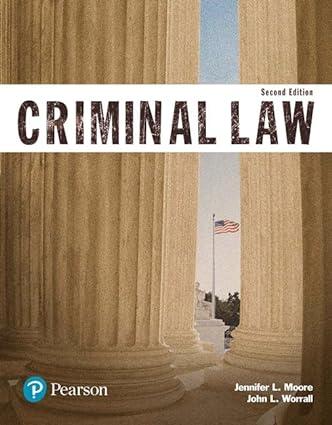Defendants Elie and Campos both are charged with three counts of violation of the Unlawful Internet Gambling
Question:
Defendants Elie and Campos both are charged with three counts of violation of the Unlawful Internet Gambling Enforcement Act of 2006 (“UIGEA”), one count of conspiracy to violate UIGEA, two counts of operating of illegal gambling businesses in violation of the Illegal Gambling Business Act of 1970 (“IGBA”), and conspiracy to engage in money laundering—all in connection with Internet poker operations.
Elie is charged also with one additional count of operation of an illegal gambling business in violation of IGBA and with one count of conspiracy to commit bank fraud and wire fraud. They both move to dismiss the indictment . . . The theory of the indictment is that defendants were, or were employed by, payment processors. In the case of Elie, the allegation is that he opened bank accounts through which Internet poker companies “received payments from United States-based gamblers.” In the case of Campos, it is that he was an officer, director and part owner of a bank that “processed payments for” two such companies.
Defendants’ principal argument with respect to the UIGEA counts is that the statute “exempts” persons like them from criminal liability either as principals or as aiders and abettors or co-conspirators. The argument commences with the fact that Section 5363 applies only to persons “engaged in the business of betting or wagering,” but that Section 5362(2) provides that the “business of betting or wagering” “does not include the activities of a financial transaction provider . . .” The defendants proceed to argue that one who “received payments from United States-based gamblers,” or a bank that “processed payments,” in each case for supposedly offshore poker companies, necessarily was a “financial transaction provider” within the meaning of the statute and nothing more.
. . . Even if it could be said with assurance that these defendants were nothing more than financial transaction providers, the motion still would lack merit. Section 5367 of the statute provides that, “[n]otwithstanding section 5362(2), a financial transaction provider . . . may be liable under this subchapter if such person has actual knowledge and control of bets and wagers, and” among other things, “owns or controls, or is owned or controlled by, any person who operates, manages, supervises, or directs an Internet website and which unlawful bets or wagers may be placed, received, or otherwise made.”
There is nothing in the indictment that would foreclose the government from establishing that these defendants are criminally liable in light of Section 5367 even if they were financial transaction providers within the meaning of Section 5363 and even if such a conclusion otherwise would require the result they advocate.
The IGBA Counts. These defendants are [also] charged, both as principals and aiders and abettors, under Section 1955 of the Criminal Code, which provides that “[w]hoever conducts, finances, supervises, directs, or owns all or part of an illegal gambling business: is subject to criminal penalties.” The key phrase is “illegal gambling business,” which in turn is defined in relevant part as “a gambling business which (i) is a violation of the law of a State . . . in which it is conducted.”
Questions:
1. Identify the two criminal statutes used to charge the defendants.
2. The defendants try to use a jurisdictional argument to escape criminal liability. What is their argument? Does it have any merit? Why or why not?
Step by Step Answer:






